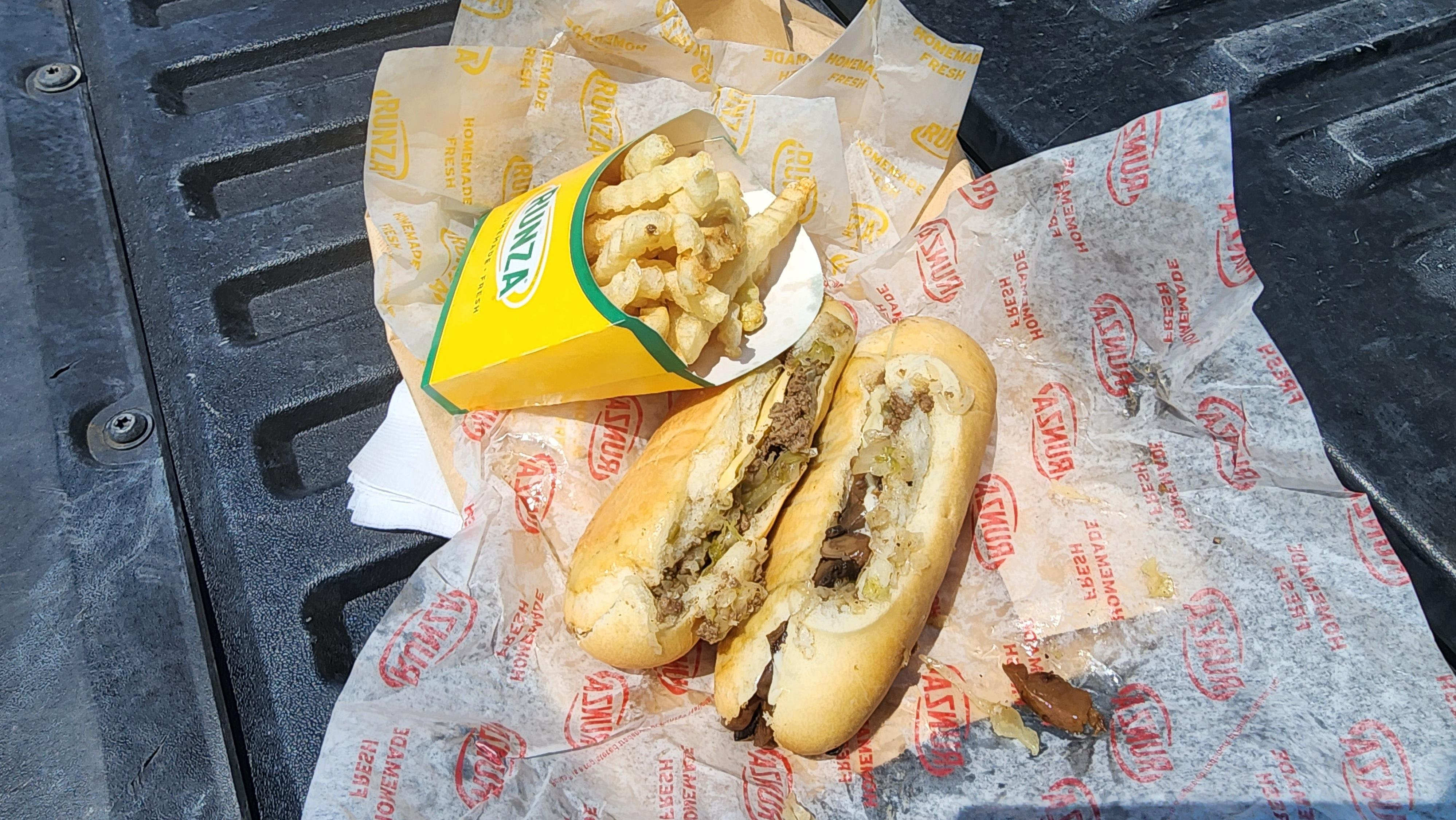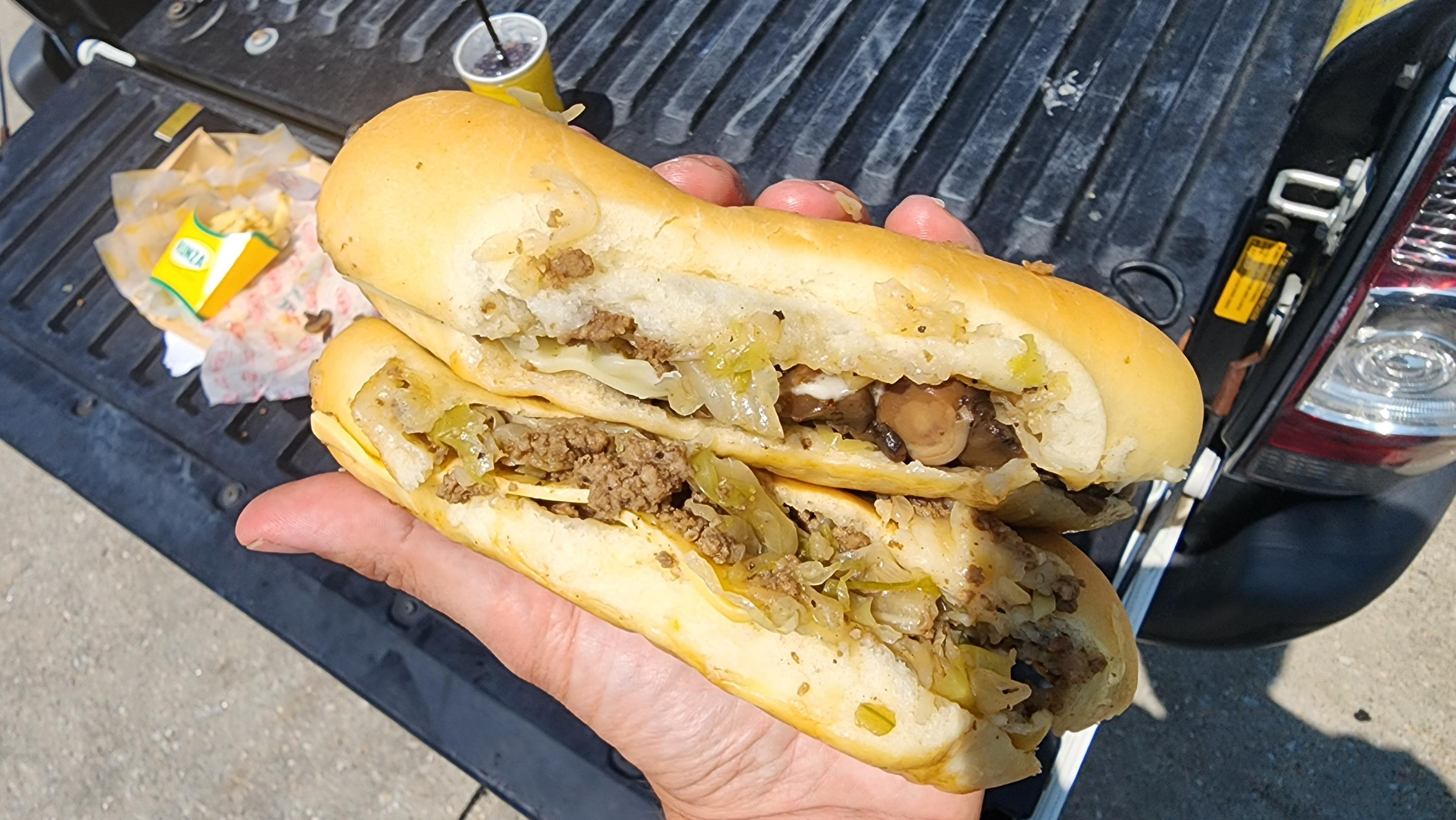Nebraska's Fast Food Is Stuck In The Past
Runza proves that when it comes to fast food, tradition isn't everything.
A fast food restaurant specializing in Hot Pocket–esque stuffed breads? Sign me up! Then sign me the hell off, because the runzas at Runza are the most disappointing thing I've eaten all year.
If you're not currently in Nebraska somewhere, you might be asking, "What the hell is a runza?" An outsider's answer: A runza is a Midwestern bread pocket filled with ground beef, onions, sauerkraut or cabbage, and sometimes cheese. The name "runza" is admittedly very fun to say out loud, with a sing-songy, Fargo-esque phonetic tune—the type of regional term you can practically hear rolling off the tongue of every aunt in Omaha. Runzas are a no-frills stalwart of church cookbooks, and while there's nothing wrong with this cheap and filling delivery system, I can't help but think that the runza ranks low in the worldwide catalog of stuffed bread.
Planet Earth is overflowing with delicious iterations of stuffed bread: calzones, kolache, pepperoni rolls, pirozhki, samosas, empanadas, and so on. The runza itself originated in Prussia, when it was called a bierock, a name awfully similar to the Turkish/Armenian/Persian börek or beorek, another savory stuffed bread that sometimes contains cabbage. The runza is specifically the contribution of German-Russian immigrants in 19th-century Nebraska, where the dish took off statewide.
So, where does the runza rank in the global list of stuffed breads? Maybe the namesake regional fast food chain Runza isn't the best barometer, but it's all I've got.
What is Runza?
Runza is a Nebraska-based fast food chain that's been around since 1949. Per the website:
Started by Sally Everett, expanded by her son, and still run by her grandchildren. Our recipes and processes are decades old. Our ingredients are not.
Pay mind to the decades old part here. Heed those words, because this loyalty to tradition forms the basis for a much larger conversation surrounding contemporary fast food.
Runza isn't a small chain. Though it's not nationwide, it boasts 85 locations, mostly in Nebraska. After that, there are a few in Colorado, two in Iowa, and one in Kansas. On my recent cross-country road trip, I stopped at one in Lincoln, Nebraska to sample a few runzas and some fries.
An honest appraisal of the runzas at Runza
I truly think this is the most unfortunate fast food I've tasted all year, and this is coming from the guy who willfully ate the Carl's Jr. Hangover Helper Meal. I ordered a Cheese Runza and a Swiss Mushroom Runza. They inspired me to frantically type up my thoughts mere moments after eating them, sitting in the empty Runza parking lot.
Was this seasoned by a ghost? Has anyone in the long chain of command at Runza actually stopped to taste the food? There seems to be a calculated absence of both salt and pepper, a blandness so apparent that it makes me wonder if Nebraskans are raised from birth to believe that experiencing flavor is a sin. It is religiously bland, if that makes sense. The runzas at Runza taste like week-old Protestant potluck casserole shoved into mass-produced bread. I want to say that I need my memory wiped of this experience, but if that happens there's a small chance that I might go eat at Runza again.
The Swiss Mushroom Runza is so aggressively boring that it somehow tastes just like the ground meat one. I get the sense that everything on Runza's menu has a uniform, company-wide mandate of flavorlessness—and what's really crazy is that there's some evidence to support this. The description of the Swiss Mushroom Runza on the website actually floored me:
The first time someone at Runza® added delectable Swiss cheese and mushrooms to their Runza® Sandwich, we tried to stop them. "That's too much flavor!" we warned.
It's a joke, sure, but since the marketing copy is speaking about mushrooms and Swiss like they're zesty, newfangled ingredients, the people in charge at Runza have inadvertently implied they are averse to change. Which brings me to my central thesis: Runza tastes bland because of its fierce loyalty to tradition.
Fast food customers don’t want tradition for its own sake
A fast food restaurant that specializes in tradition is one that's inherently stuck in the past. Spoiled for choice, Americans of the 21st century crave tasty chaos. We love Mexican pizza, orange chicken sandwiches, ghost pepper fries, mushroom truffle burgers, fajita quesadillas, and smashburgers mashed up with mac and cheese. We don't go to fast food joints to eat traditional meat-and-potatoes meals anymore. The bar has been raised, and we expect to have sloppy, unexpected, and innovative fun with our food.
The closest Runza gets to having this sort of fun is a Southwest Runza, which features the addition of salsa and tortilla chips. Everything else feels a little staid and risk-averse. Why not follow trends and take some big swings? Go after a spicy runza, a birria runza, a meatball runza, or even a mac and cheese runza. Anything is better than unseasoned ground meat and cabbage. Anything.
Some good news: Runza's crinkle-cut fries are really good. They're crispy, salty, and certainly arrive at the restaurant frozen, but frozen fries often exceed their freshly made counterparts. Not trying to make fresh-cut fries is Runza's primary demonstration of good judgment. Looking at the website, I see images of a fantastic-looking swirled ice cream sandwich, and Reddit users herald Runza's burgers as a highlight of the menu. So it sounds like there are plenty of ways to enjoy Runza without eating runzas.
If Runza weren't so evidently beholden to tradition as a central tenet of its marketing, it would be interesting to see just how exciting its menu could get. Tradition is best left to local food sources and mom-and-pop institutions. When it comes to large-scale fast food operations, I'd argue that we need something more of the moment. With just a few minor adjustments and an extra sprinkling of salt, Runza could be a truly great stuffed bread restaurant.

